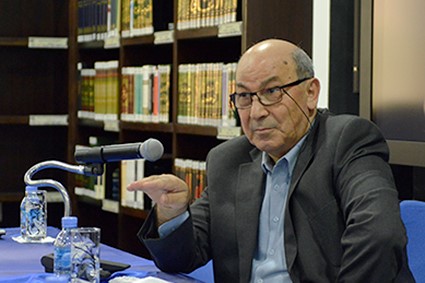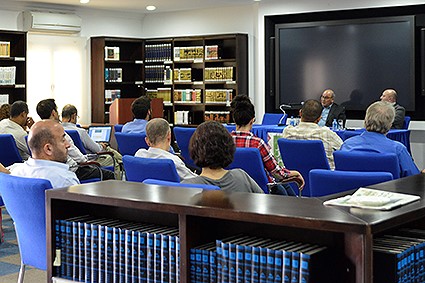 |
| Shamseddin Alkelani |
Syrian scholar Shamseddin Alkelani, a researcher in the ACRPS’s Unit for Contemporary Studies, addressed the Center’s audience on Wednesday, May 7, during a weekly seminar held by the ACRPS. Alkelani examined a number of Western perspectives on Islamist politics, focusing on four well-known Orientalists: Bernard Lewis, Montgomery Watt, Bertrand Badie, and Olivier Roy.
He began by pointing out that for both Bernard Lewis and contemporary political Islamists, state and religion are intimately, even “organically,” linked. He noted that according to Lewis, the historical experience of Islamic civilizations differed fundamentally from those under Christendom in that there has never been an Islamic separation between “Church” and “State”. Importantly, Lewis’s thesis suggests that not only was the separation of church and state alien to Islam, but the very ideas of citizenship and human rights were as well. When these concepts were imported from the West, suggested the late orientalist, they were stripped of their associations with the principle of liberty.
Alkelani then spoke about the work of Montgomery Watt, whose scholarship takes more of a historical approach and arrives at a conclusion different from that of Lewis. Watt pointed out how the story of the development of Islam could be divided into two eras: “Meccan” and “Medinan”. During the earlier Meccan period, the early Islamic community had no political dimensions, and according to Watt, the early Muslim community became politicized only after the emigration of the early Muslim community to Medina—ushering in the Medinan era. These political dimensions were made possible, in Watt’s view, by Islam’s societal aspect. Watt does not, then, view religions as being essentially tied to specific political concepts; rather, he holds that there is a level of compatibility between religions and political concepts prevalent at the time and place of their birth. He holds that this also applies to Islamic societies, particularly during the Umayyad and Abbasid caliphates.
Alkelani introduced Bertrand Badie, whose broad comparative approach led to a conclusion on the different ways in which individualism emerged in Western versus Islamic civilizations. While modernity took root in the West through the liberation of individuals from empires, the political realm in Islamic societies was formed by the establishment of empires, which diminished social ties based on tribal and sectarian and confessional affiliations
 |
| Attendance |
Badie also focused, as did Max Webber and Ignac Goldziher, on the role warrior leadership played in the creation of the Islamic empire and its form of government. Alkelani explained another of Badie’s insights—the tension between temporal and theological facets of authority in Islamic societies. Clerics and jurisprudents throughout Islamic history pragmatically, if grudgingly, accommodated the titular religious authority of the caliphs. This compromise, however, continues to be felt in the form of a tension between a desired legitimacy and de-facto leadership. In contrast, societies under Christendom unified these two facets of authority, paving the way for a dialectic to take shape along a nexus of government versus opposition.
The last orientalist whose work was treated in depth by Alkelani was Olivier Roy, a French scholar presently working in Italy who, according to the lecturer, provides insightful, critical work. Roy’s scholarship is marked by his confrontational approach toward contemporary political Islam. He works to unravel the ideology of contemporary Islamists and demonstrate its conceptual frailty. Alkelani suggests that Roy goes beyond the political posturing of contemporary Islamist groups to assess their most fundamental principles and to use these to criticize their strategies and tactics.
Alkelani held that Roy’s work is characterized by emotive language and “cognitive tension,” but that his arguments remain valid and coherent nonetheless. While his arguments go beyond the general simplistic and common Western views on Islam, Roy’s lack of academic sophistry makes it difficult for his work to remain unbiased, particularly during a time when typical stereotypes of political Islam are epitomized by the Taliban and al-Qaeda.
The discussion that followed Alkelani’s presentation revealed the diversity of opinion and the extent of interest in this very topical subject.